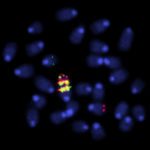Lien vers Pubmed [PMID] – 12901966
Lancet Oncol. 2003 Aug;4(8):505-14
Human cancer is characterised by complex molecular aberrations which result in a wide variety of clinical manifestations. B-cell chronic lymphocytic leukaemia (B-CLL) is particularly diverse, both in terms of molecular changes and clinical course, and consequently our understanding of the pathology of this disease is generally poor. Furthermore, the heterogeneity of this tumour type coupled with the absence of an obvious genetic “hallmark”, such as gain of oncogene function or loss of suppressor-gene function, has led many investigators to question whether B-CLL is a single disease entity. In most cases, B-CLL does not show specific reciprocal chromosomal translocations as found in other haemopoietic malignant diseases. The genomic instability of B-CLL results in numerous different types of chromosomal losses and gains, giving rise to unsettled karyotypes among individuals with this disease. Nevertheless, genetic data imply that B-CLL is a single disease characterised by a common gene-expression profile and by the existence of specific subtypes that may have clinical correlates in patients.

